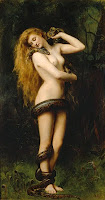Of all the Goddesses, Lilith is probably one of more confusing and misunderstood. This tends to be due to her appearing in various Near East mythologies and folklore where her name may have been epithet for a group of "female demons" from Babylonian text, the "Lilitu". However, to the Canaanities, Lilith was Baalat, the "Divine Lady" and on a tablet found in the ancient city of Ur dating to ca.2,000 BCE, she was "Lillake".
More commonly, Lilith is known by her Hebraic association was the original wife of Adam. One story mentions that she as Adam were created as cojoined twins, joined at the back. After denied as beign perceived as Adam's equal, she left him in anger. Similarly, in another story, Adam married her after he became tired of coupling with animals. However, when Adam tried to make her lie beneath him during sexual intercourse, Lilith would not meet this demand of male dominance. She was said to then cursed Adam and took up residence in a cave by the Red Sea.
After Adam complained to God, three angels, Sanvi, Sansanvi and Semangelaf, were sent to bring Lilith back to Eden. Lilith rebuffed the angels for she had a lover to demons and produced 100 babies a day. The angels advised her that God would take these demon children away from her unless she returned to Adam. When Lilith did not return, she was punished, and the more "docile" Eve was created as Adam's substitute partner.
This, however, appears to be only one slant to who Lilith was and what she can bring to the modern person. The oldest known term relating to Lilith would be the Sumerian word "Lili" (plural "Lilitu"), which seems to imply the same definition as our word "spirit." In many ancient cultures, the same word for "air" or "breath" would also be used for "spirit". The very word "spiritus" is one such example.
Modern interpretation of Lilith is that she is is "female defiance and strength". Her resulting attack on men in the night is the revenge of the woman on the men who have hurt her. Whilst this may be so, Lilith also attacks women and their babies. She is also perceived to be a Great Goddess within Sumeria, as well as a handmaiden to the Goddess, Inanna. Khephera advises, however, that there is actually no archeological evidence supporting this modern interpretation.
Instead, they suggest that Lilith can be perceive as the Jungian "Shadow Self". She is our subconscious, that part of us that is most animal like, defiant, uncivilized, passionate, and basically natural. She is sex. She is everything that our (screwed-up) society frowns upon; a society that has been taught for thousands of years to suppress everything within us that is most natural and enjoyable. She is just as described by the Religious interpretation—she is Babylon.
Whatever interpretation we may have of Lilith, there is one theme that is common to all - that she is certainly someone (demon, spirit, Goddess or otherwise) who forces us to take a good look at ourselves and our perceptions. She challenges us to ascertain what our inner truth is - and its origins (are we living our "truth" or merely enacting out someone else's?)
Lilith is one of the aspects of the Goddess we will be working with during the 2012 Encountering the Dark Goddess workshop that will take place in Adelaide on Saturday, 26 May 2012.
Sources:


No comments:
Post a Comment